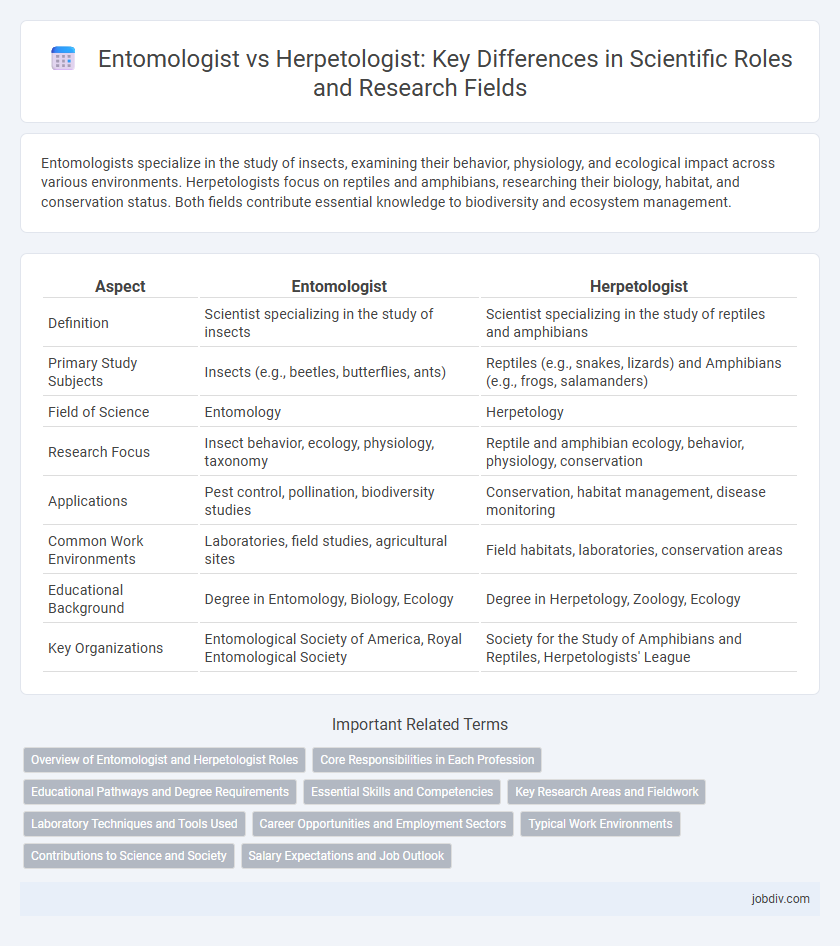Entomologists specialize in the study of insects, examining their behavior, physiology, and ecological impact across various environments. Herpetologists focus on reptiles and amphibians, researching their biology, habitat, and conservation status. Both fields contribute essential knowledge to biodiversity and ecosystem management.
Table of Comparison
| Aspect | Entomologist | Herpetologist |
|---|---|---|
| Definition | Scientist specializing in the study of insects | Scientist specializing in the study of reptiles and amphibians |
| Primary Study Subjects | Insects (e.g., beetles, butterflies, ants) | Reptiles (e.g., snakes, lizards) and Amphibians (e.g., frogs, salamanders) |
| Field of Science | Entomology | Herpetology |
| Research Focus | Insect behavior, ecology, physiology, taxonomy | Reptile and amphibian ecology, behavior, physiology, conservation |
| Applications | Pest control, pollination, biodiversity studies | Conservation, habitat management, disease monitoring |
| Common Work Environments | Laboratories, field studies, agricultural sites | Field habitats, laboratories, conservation areas |
| Educational Background | Degree in Entomology, Biology, Ecology | Degree in Herpetology, Zoology, Ecology |
| Key Organizations | Entomological Society of America, Royal Entomological Society | Society for the Study of Amphibians and Reptiles, Herpetologists' League |
Overview of Entomologist and Herpetologist Roles
Entomologists specialize in the study of insects, focusing on their behavior, ecology, physiology, and classification to understand their impact on agriculture, ecosystems, and human health. Herpetologists study reptiles and amphibians, examining their evolutionary biology, habitats, and conservation status to address environmental changes and species preservation. Both roles contribute critical scientific knowledge vital for biodiversity research and environmental management.
Core Responsibilities in Each Profession
Entomologists specialize in studying insects' biology, behavior, and ecology, often conducting field research to manage pest populations and enhance agricultural productivity. Herpetologists focus on reptiles and amphibians, investigating their physiology, habitats, and conservation to preserve biodiversity and understand environmental changes. Both scientists use taxonomy and ecological data but apply their expertise to different classes within the animal kingdom.
Educational Pathways and Degree Requirements
Entomologists typically pursue a bachelor's degree in entomology, biology, or a related field, followed by master's or doctoral degrees specializing in insect science or ecology. Herpetologists usually obtain a bachelor's degree in zoology, wildlife biology, or ecology, advancing with graduate studies that focus on reptiles and amphibians. Both fields require strong foundations in biology and field research, with advanced degrees often necessary for research, teaching, or specialized conservation roles.
Essential Skills and Competencies
Entomologists require strong skills in insect identification, taxonomy, and ecological data analysis to study insect behavior and populations effectively. Herpetologists need expertise in amphibian and reptile physiology, habitat assessment, and field research techniques to monitor species diversity and conservation status. Both professionals benefit from proficiency in GIS mapping, statistical software, and scientific communication for publishing research findings and influencing environmental policy.
Key Research Areas and Fieldwork
Entomologists primarily focus on the study of insects, investigating their behavior, ecology, and physiology, often conducting fieldwork in diverse habitats such as forests, grasslands, and agricultural areas to collect specimens and observe insect interactions. Herpetologists specialize in reptiles and amphibians, emphasizing research on species diversity, habitat use, and conservation status, frequently performing field studies in wetlands, rainforests, and deserts to monitor populations and environmental impacts. Both scientists employ specialized methods such as trapping, tagging, and environmental sampling to gather data essential for understanding biodiversity and ecosystem health.
Laboratory Techniques and Tools Used
Entomologists utilize stereomicroscopes, insect nets, and DNA barcoding techniques to study insect morphology, genetics, and behavior within controlled laboratory environments. Herpetologists employ tools such as ophthalmoscopes, thermoregulation chambers, and radio telemetry devices to examine reptiles and amphibians' physiological functions and habitat interactions. Both specialists rely on advanced molecular analysis and imaging technologies to enhance species identification and ecological research accuracy.
Career Opportunities and Employment Sectors
Entomologists primarily find career opportunities in agricultural research, pest management, environmental consulting, and pharmaceutical companies, focusing on insect behavior, ecology, and control methods. Herpetologists typically work in wildlife conservation, zoological parks, environmental agencies, and academic research, specializing in reptiles and amphibians' biology and habitat preservation. Both professions benefit from roles in academia and government research institutions, but the sector emphasis differs due to their distinct biological focus.
Typical Work Environments
Entomologists primarily conduct research in laboratories, greenhouses, and natural habitats such as forests and agricultural fields to study insect behavior, physiology, and ecology. Herpetologists usually work in similar settings but often spend more time in wetlands, deserts, and tropical environments to observe reptiles and amphibians in their natural ecosystems. Both professionals may also collaborate with museums, universities, and conservation organizations to analyze specimens and promote biodiversity conservation.
Contributions to Science and Society
Entomologists study insects, contributing significantly to agriculture by developing pest control methods that enhance crop yields and prevent vector-borne diseases affecting human health. Herpetologists focus on reptiles and amphibians, advancing knowledge in biodiversity conservation and environmental monitoring through their research on species sensitive to habitat changes. Both disciplines play critical roles in ecosystem management and inform public policies for sustainable environmental practices.
Salary Expectations and Job Outlook
Entomologists typically earn an annual median salary of around $75,000, driven by their expertise in insect behavior, ecology, and pest control, whereas herpetologists, specializing in reptiles and amphibians, have a median salary closer to $65,000 due to the niche nature of their work. The job outlook for entomologists is projected to grow by 8% over the next decade, fueled by the need for pest management and agricultural research, while herpetologists are expected to see slower growth at approximately 4%, reflecting more limited research and conservation funding. Both careers demand advanced degrees and offer opportunities in academia, government agencies, and environmental consulting firms.
Entomologist vs Herpetologist Infographic

 jobdiv.com
jobdiv.com